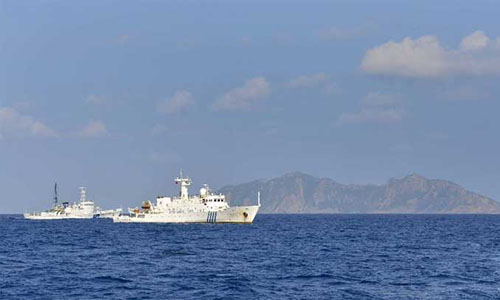
The China Marine Surveillance ships patrol around the Diaoyu Islands, October 25, 2012. Photo: Xinhua
During his first phone call with his Japanese counterpart Kitamura Shigeru, new US secretary of defense Lloyd Austin confirmed that Article 5 of the US-Japan security treaty covers the Diaoyu Islands, Reuters reported on Sunday, citing a Pentagon statement.
Three days earlier, on January 21, Tokyo-based NHK reported that the Japanese and US national security advisers have stressed the importance of the Japan-US alliance in their first talks since the inauguration of US President Joe Biden. Meanwhile, US National Security Adviser Jake Sullivan made similar remarks about the Article 5.
To Japan, the US is its sole ally. Their alliance is viewed as the basis for Japan's diplomacy. Reiterating the importance of the US-Japan alliance and reaffirming the applicability of the Article 5 over the Diaoyu Islands meet Tokyo's desires. It aids its bid to see homegrown diplomatic policies endorsed.
However, as Washington clearly knows Beijing's attitude toward territorial issues, one might ask: To what extent will the US fulfill commitments to Article 5? This remains very questionable. It is obviously an unwise choice for the Japanese government to take US officials' remarks as an infallible guarantee. The Article 5 itself is ambiguous. It implies that the US will help defend Japan, but without stipulating by what means this might be executed. Will the US directly send in troops? Or will it just assist with logistical support? Washington has assured itself plenty of room to maneuver with it.
These comments actually show nothing new. They are merely the current US administration's echo of the old, so-called promises over the Diaoyu Islands to Japan.
Still, this gesture means to show US policy consistency. It also intends to enhance the US-Japan alliance. After all, Japan is an important pillar for US' campaign against China in Asia and globally. By discussing the Diaoyu Islands twice in a handful of days, the US is attempting to convince Japan that China is their common target.
Regardless of the essence of US remarks over the islands - no matter whether Washington is really making meaningful moves or just paying lip service to Tokyo - the Chinese government must be prepared for the worst-case scenario in which the US-Japan security treaty is what China must face, said Song Zhongping, a Chinese military expert and commentator.
"Despite the attitudes of the US and Japan, the People's Liberation Army [PLA] should eye on the Diaoyu Islands to improve its capabilities of responding to the simulated enemies. This is an important lesson the PLA needs to get itself ready," Song said, "There should be emergency plans as well as plans for potential combat in the future."
Nonetheless, the Chinese government has always adhered to the stance that both China and Japan should manage differences through dialogues, promote practical cooperation in the maritime field, and effectively maintain the stability and peace of the East China Sea.
This is more in line with the actual interests of China and Japan. Resorting to forces or bringing in non-regional countries to interfere is something Japan should hopefully avoid. Managing differences via talks is beneficial to all sides involved, including the US, although it is far away from the region.
It is evident to all what the US is really up to. Being overly worried about China's rise, the US wants to contain China from developing further. Such a mentality won't help the world advance. Japan should avoid miscalculating the US' intentions, and thus not go too far in terms of pushing the Diaoyu Islands issue.




